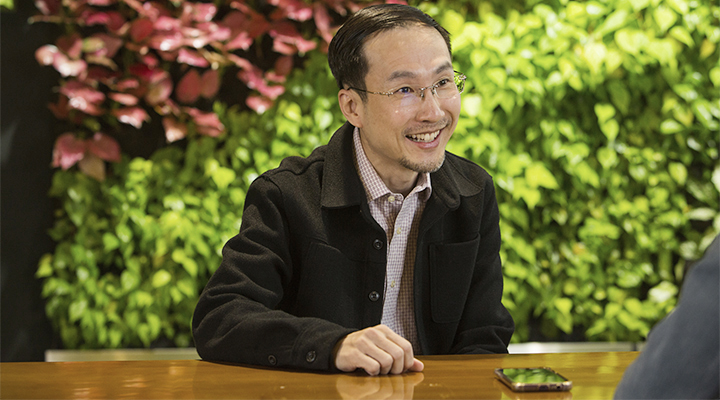“If There's Any Pain, We Feel It First.”

If the Singapore Public Service can be thought of as a body, the Central Provident Fund (CPF) Board would be the nerve endings: It is where the pain is felt first.
Giving the analogy, its CEO, Augustin Lee, said that in difficult times, people tend to think about their CPF monies first and would approach the Board to either withdraw more or withdraw earlier than the rules allow.
In fact, during the COVID-19 crisis, he said that appeals to the CPF Board, which in addition to collecting and taking care of Singaporeans’ retirement savings also manages government disbursements to citizens, increased from the usual of about 6,000 per month, to more than 8,500.
Usually, the Board accedes to about 80% of the appeals. The remaining 20% are those who cannot draw down their CPF for various reasons, some of whom are in genuine distress.
Videos by Eric Lin
Solutions without boundaries
For these distressed citizens, the Board now goes the extra mile by enlisting other agencies to give them the help they need.
Said Augustin: “The correct solution is not for us to say yes to their appeal, because if we say yes then they are going to compromise their future retirement. But their current predicament still needs addressing.”
RAMP, or the Rejected Appeals Management Protocol, is one of the more important initiatives Augustin introduced when he took over in April 2019. The aim is to offer “solutions without boundaries”.
So if someone who had lost his job and also has an ill parent goes to the CPF Board to ask for money, the CPF officer would not stop at a rejection letter. The officer would connect him to the public hospital, where a medical social worker can ensure the ill parent gets the necessary treatment via various financial schemes, as well as to the Ministry of Social and Family Development for financial aid.
Get more of such stories in your inbox by subscribing to the Challenge newsletter.
CPF for retirees of the future and today
Young Adults
Encouraging the savings habit also extends to the CPF Board’s use of social media and trying new ways to engage young Singaporeans, who are challenging to reach out to.
It has come up with a podcast on Spotify called “Let’s Talk CPF”, targeted at Millennials, and which has more than 10,000 listens since mid-February 2020.
It is going into schools to educate teenagers via games and carnivals on the need to plan for the three basic needs – housing, healthcare, retirement – and sound financial management principles, like the power of compound interest.
Most of all, the Board is working to persuade young people that they need CPF now more than ever.
“For retirees of the future, their retirement income is more dependent on the adequacy of their CPF as compared to today’s retirees,” said Augustin, who has two daughters aged 12 and 16.
Videos by Eric Lin
They may live longer, have fewer or no children to depend on, and – unlike their parents or grandparents – would not be able to rely on properties that grew exponentially in value.
Self-Employed Persons
He is also concerned about freelancers, who do not have employers to make CPF contributions on their behalf.
Augustin, who worked on a detailed report about freelancers in Singapore while he was at the Ministry of Manpower for 10 years before the CPF Board, said the major finding from that was that 85% of freelancers in Singapore had chosen to freelance, even though they could have secured full-time jobs.
“Once we accept that many who are self-employed chose to be self-employed, we need specific policies for them,” he said.
Seniors
The CPF Board wants to persuade more Singaporeans to voluntarily put money into their CPF accounts. To give them an incentive, under the Matched Retirement Savings Scheme to be implemented in 2021, the government will match every dollar of cash top-up made, up to an annual cap of $600, for senior Singaporeans who have yet to meet the basic retirement sum.
And to those who think they do not want their money to be “trapped” in the CPF and invest it on their own, Augustin has this to say: “Unless a person has the time and the financial knowledge to invest, in most cases their investment rate of return will not beat the CPF interest rate of 4% per annum.”

Communicating and countering misinformation
When it comes to communicating with younger Singaporeans, it helps that the CPF Board, among all public service agencies, has one of the youngest workforces.
Augustin shares that, at age 48 when he first assumed the role, he is one of the oldest CEOs the Board has ever had; although off work, he likes to play Horizon Zero Dawn with his daughters on a PS4. A “small” way he adapts to a younger workforce is by requesting CPF colleagues to address him by his first name instead of the more common public service practice of using work titles.
Communication and engagement, not just with the young, but with all Singaporeans, is more critical than ever in the age of misinformation and misinterpretation.
One of the biggest challenges the CPF Board has to face is a perception that it is a “heartless” organisation. As various social media posts circulated about how CPF does not help Singaporeans, there have been times when some colleagues going to work were afraid to tell taxi drivers their destination.
In some instances, there is no getting around the need to confront misinformation with facts.
Thus, the approach now is that if there are viral social media posts that only present one side of the story, a quick response team comprising officers from the CPF Board and other relevant ministries will respond to provide a comprehensive, factual account to the public.
While it may seem heavy-handed, Augustin, who encouraged this new approach in early 2019, explains there is a due process which precedes any response from the CPF Board: They first contact and listen to the person whose story went viral, and only put up a statement if the person insists on misrepresenting their case.
“After we did this a few times, I think Singaporeans began to realise that many of these stories were not the whole truth,” he said.
This approach is one reason why Augustin thinks CPF, usually an election hot-potato topic, was not a major issue during the recent General Election.
“I did not convert my colleagues from being heartless to being full of heart,” said Augustin. “They were already full of heart from before. But I think we communicate better now and we put out the full facts when the other side misrepresents.”
Enabling better decisions amid growing complexity
As the environment becomes more complex, organisations find themselves having to move faster. Actions may become less coordinated, and a common response is to add more rules to regulate the chaos. “However, people burn out when they need to comply with more rules while maintaining speed,” said Augustin. “Bottlenecks in decision-making also occur. This is a vicious cycle.”
That is why Augustin, as a leader, focuses on giving context, instead of exerting control. “It is every leader’s job to provide the context, so that their officers can make the right decisions.”
For example, policymakers from various ministries create appeal rules that are generally prescriptive for processing officers to follow. Although policymakers always take into account extensive appeal scenarios, processing officers inevitably encounter new scenarios.
“Instead of surfacing such cases back to policymakers, which may lead to more rules being prescribed, the better approach is to explain the objectives of the policy to the processing officers and empower them to make the right decisions,” Augustin explained.
To ensure governance and fairness for appeals, the Board worked out with policymakers an agreement on the boundaries to observe. Officers also take part in regular sharing sessions to ensure a broad consistency when applying appeal guidelines.
This approach, over time, empowers the processing officers to exercise judgement and also encourages them to suggest improvements to policies based on their experiences on the ground, he pointed out. This promotes an important mindset change to help them navigate a more complex future.
“I hope that at every level, each of us can provide context to empower others to make the right decisions.”

What’s your favourite drink?
Water!
Where do you have it and how often?
Many times a day
- POSTED ON
Dec 8, 2020
- TEXT BY
Wong Sher Maine
- PHOTOS BY
Norman Ng









